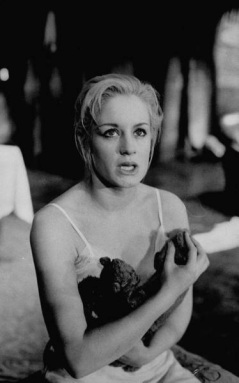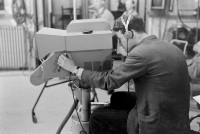Paris, you will be delighted to know, looked gorgeous in the spring sunshine over the past two days. Not, of course, that I saw much of the city, because I was attending the colloquium Théâtre au cinéma / cinéma au théâtre: aires culturelles francophones et anglophones at which I was presenting a paper. This was the first conference in 2012 at which Screen Plays was represented – but there are plenty more to come in the year, including the Classical Association Annual Conference and the Performance and Television Space Conference, both in April, the International Screen Studies Conference at the end of June and our own one-day event on 19 October (further details of which will be available soon).
Théâtre au cinéma… was organised by CRIDAF at Paris 13 University, Passages XX-XXI at Lyon 2 University, the New York University in France, le groupe de Recherches en Arts Dramatiques Anglophones Contemporains and the Magic Cinema, and it is intended that there will be a complementary event in 2013 focussing more on cinema in theatre (the emphasis here was the other way around). Topics included Sarah Bernhardt’s 1912 film Queen Elizabeth (link: YouTube) and its part in the invention of the feature film, Broadway theatre and the end of cinema censorship in the United States, and the competing film versions of Antony Shaffer’s play Sleuth, brought to the screen by Jospeh L. Mankiewicz in 1972 and Kenneth Branagh in 2007. Since something over half of the papers were delivered in French, my schoolboy comprehension was, to say the least, challenged.
I spoke on National Theatre Live – that is, theatre in cinemas (plural) – and the history of live theatre on British television, drawing on some of my Illuminations blog posts about the former (here, here and here) and some of the material about the latter presented on this blog (including here, here and here). There were times when I felt something of an impostor given that my focus was in large part on theatre on television, but in fact this awareness underpinned the key idea that for me was underlined by the colloquium.
I came away with a sharper than ever awareness of the importance of understanding the histories of theatre, cinema and television as intimately and inextricably intertwined. Most scholars have traditionally explored the developments in just one of these media, and where they have looked at a pairing it has often been, for example, so as to define cinema against the theatre or of film against television. Yet the professional lives of three very different people – each the subject of a paper in Paris – exemplify the connections between theatre, cinema and television that are ripe for detailed reflection.
 Victoria Lowe from the University of Manchester presented a paper about Basil Dean, a prominent theatre producer of the 1920s and ’30s. At the advent of sound cinema in Britain Dean set up a company to make feature films from dramas by contemporary playwrights like John Galsworthy and J. M. Barrie. (Dean’s papers are held by The John Rylands University Library at Manchester.) Escape (1930), an early British talkie produced by Dean and adapted from a play by Galsworthy, was one attempt to make a sound film using British voices speaking British words aimed at securing a place in an international marketplace dominated by Hollywood.
Victoria Lowe from the University of Manchester presented a paper about Basil Dean, a prominent theatre producer of the 1920s and ’30s. At the advent of sound cinema in Britain Dean set up a company to make feature films from dramas by contemporary playwrights like John Galsworthy and J. M. Barrie. (Dean’s papers are held by The John Rylands University Library at Manchester.) Escape (1930), an early British talkie produced by Dean and adapted from a play by Galsworthy, was one attempt to make a sound film using British voices speaking British words aimed at securing a place in an international marketplace dominated by Hollywood.
Dean was also the stage producer of J. B. Priestley’s comedy When We Are Married that in November 1938 was the first British theatre play to be broadcast live on television (see blog posts here and here). Although of hardly equal importance in his life (the small screen was only occasionally significant), cinema, theatre and television all played a part in his career, and their inter-relationships in his career definitely suggest a fruitful course for further research.
Nearly two decades on, in early 1956 Tony Richardson had just directed Othello for BBC Television and was staging John Osborne’s Look Back in Anger for the English Stage Company at the Royal Court Theatre. In the autumn of 1956 there was a live broadcast of part of Act II of the play on BBC Television. Within three years, as the colloquium heard from Anne-Lise Marin-Lamellet from Université Grenoble 3, Richardson had also adapted the stage production into a feature film. Although Richardson was extraordinarily dismissive of television in the 1950s, and although film historians have mostly written about his cinema career without taking any account of his small screen productions, he is another figure who is illuminated in new ways when his contributions to the three media are discussed together.
The playwright Andrea Dunbar wrote only three plays before her death in 1990 from a brain haemorrhage at the age of twenty-nine. The second of these, Rita, Sue and Bob Too, was filmed in 1986 for Channel 4 by director Alan Clarke, and a street theatre performance of extracts from the first, The Arbor, is one strand of Clio Barnard’s remarkable eponymous film, which was supported by both cinema and television funding. At the colloquium, Laura Sava from the University of Warwick argued persuasively for the importance of this recent ‘intermedial mix-and-match’ which draws on cinema forms, television codes (with talking head interviews), archive materials and techniques of verbatim theatre. Dunbar is a third figure whose work needs to be understood beyond the boundaries that have traditionally been seen to separate theatre, cinema and television. But connections and cross-overs are there to be explored in the professional lives of many major figures and in the histories of numerous institutions. The more intermedial interrogations there are like those showcased at the Paris colloquium, the richer will be our cultural understandings.



While you had that one disappointment with ACE, the rest of your month seems to be going superbly. What can be better than speaking about Screen Plays and theater — in Paris — and in the spring.
Posted by Helene | 17 March 2012, 2:19 pmAn important insight, John! Thank you.
Posted by Amanda Wrigley | 19 March 2012, 10:00 am